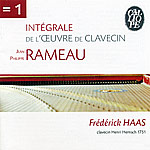This is a reissue of two full-price CDs (Calliope 9278 and 9279) that received scant distribution in the U.S. when they were first offered in 1998. Now as part of the label’s generally excellent two-for-the-price-of-one “intégrale” series Frédérick Haas’ unique take on Rameau returns as a better value, even if it isn’t a first recommendation. What makes Haas’ cycle inconsistent is his tendency to highlight the expressive extremes of certain movements while treating most others in a more “play the notes and let the music speak for itself” manner.
For example, in the fourth-movement Courante of the Suite in C (1706) Haas is fabulously quirky, with a playful, nearly disingenuous lack of concern for consistency of articulation. In the same spirit, Haas’ rendering of the final Le Lardon/Minuet/La Boiteuse of the Suite in C (1724) is distinctive in its inelegant, Germanic formality. Les Trois Mains of the Suite in C (1728) and L’Enharmonique of the Suite in G (1731) are given uncharacteristically swift, flashy performances as Haas negotiates the complex rhythms of each with great skill and panache. However, in the final movement of Pieces en Concert Haas goes to the opposite extreme, offering one of the slowest, most languid performances ever, barely sustaining the musical line.
Haas’ choice of a robust period Henri Hemsch harpsichord (the builder was a friend of the composer) couldn’t be more appropriate for Rameau’s colorful palette. Not all listeners will appreciate Haas’ periodic eccentricities, though his accomplishment nevertheless remains worthy of consideration by Rameau completists, particularly in those pieces on which he lavishes the most attention, whether for good or ill.
































